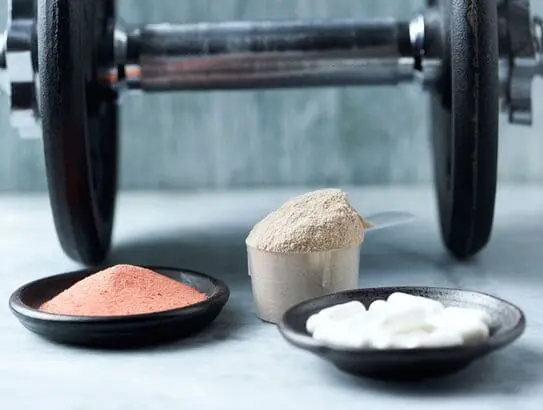Does Creatine Expire? How to Tell If Your Creatine Is Still Effective

March 1, 2024
If you’re into fitness, bodybuilding, or any kind of athletic training, chances are you’ve come across creatine. It's one of the most popular supplements out there, known for improving strength, endurance, and muscle recovery. But like any supplement, you might wonder, does creatine expire? And if it does, how can you tell if it’s still effective? Understanding these key points will help you get the most out of your creatine use, ensuring you're not wasting money or hindering your progress with a less potent product.
In this post, we’ll break down everything you need to know about creatine’s shelf life, how to spot expired creatine, and tips to ensure your creatine stays as effective as possible. Whether you're using the best creatine on the market or a budget-friendly option, the information below will help you make informed decisions about your supplements.
How Long Does Creatine Last?
When stored correctly, creatine has a long shelf life, which is one of the reasons it’s such a popular supplement. On average, creatine monohydrate can last anywhere from two to five years before it begins to degrade. The shelf life may vary slightly depending on the type of creatine you’re using, but overall, it’s a stable compound that holds up well under most storage conditions.
Factors That Affect Creatine Shelf Life
While creatine itself is quite resilient, there are several factors that can reduce its effectiveness over time:
- Exposure to moisture: Creatine monohydrate is known to absorb moisture, which can lead to clumping and degradation. If the creatine has been exposed to humidity or moisture, it may start to break down into creatinine, a byproduct that is less effective for muscle performance.
- Heat: Storing your creatine in a hot environment can speed up its breakdown, leading to a reduction in potency. Always store creatine in a cool, dry place to prolong its shelf life.
- Light exposure: Like many supplements, creatine can degrade faster if exposed to direct sunlight. Keeping it in a dark, airtight container will help ensure it lasts as long as possible.
The best creatine products usually come with clear storage instructions, and following these guidelines is key to maintaining their effectiveness.
How to Tell If Your Creatine Has Expired
Even though creatine is stable, it doesn’t last forever. Here's how you can tell if your creatine has expired or if it's still effective:
1. Check the Expiration Date
The first step is simple: check the expiration date printed on the packaging. Most creatine supplements will have an expiration date that tells you when the manufacturer guarantees the product will remain effective. If your creatine is past this date, it doesn’t necessarily mean it’s completely useless, but the quality and potency may have started to decline.
2. Look for Changes in Appearance
Expired creatine often changes in texture and appearance. Fresh creatine powder is usually fine, white, and free-flowing. If your creatine has turned clumpy, discolored, or has a grainy texture, these could be signs of moisture absorption or degradation. Clumping, in particular, is a telltale sign that moisture has compromised the product, leading to the breakdown of creatine into creatinine.
3. Smell and Taste Test
While creatine is mostly flavorless and odorless, expired creatine can develop an unpleasant taste or odor. If you notice any strange smells or tastes, it’s a good indicator that the creatine has gone bad, and you should discard it.
4. Watch for Reduced Effectiveness
If you’ve been using creatine for a while, you likely know how your body responds to it. If you suddenly notice a drop in performance, strength, or endurance while using the same dosage, your creatine might have lost its potency. This is especially true if you’ve been using an old or improperly stored supplement.
Tips for Storing Creatine to Maximize Effectiveness
To ensure your creatine lasts as long as possible and remains effective, proper storage is crucial. Here are some simple yet effective tips to help you maintain the quality of your creatine supplement:
Our Top Recommendations

Optimum Nutrition Micronized Creatine Monohydrate Powder
Micronized for easy mixing, supports muscle growth and endurance.
See on Amazon$0.35 per 5g serving

Nutricost Creatine Monohydrate Micronized Powder
Third-party tested, non-GMO, 5g of pure creatine per serving.
See on Amazon$0.2 per 5g serving

NSF Certified, supports muscle power and recovery.
See on Amazon$0.46 per 5g serving

ProMix Creatine Monohydrate Powder
Micronized, additive-free, ideal for performance and recovery.
See on Amazon$0.36 per 5g serving

NOW Foods Sports Nutrition Unflavored
100% pure creatine, GMP certified, boosts strength and endurance.
See on Amazon$0.2 per 5g serving
1. Store in a Cool, Dry Place
The best way to prevent creatine from absorbing moisture or breaking down due to heat is to store it in a cool, dry place. Ideally, keep your creatine in a pantry or cupboard away from direct sunlight and humidity.
2. Use an Airtight Container
Even though creatine usually comes in a sealed container, you may want to transfer it into an airtight container if you live in a particularly humid environment. This extra layer of protection will help prevent moisture from sneaking in and degrading the powder.
3. Avoid Storing in the Bathroom or Kitchen
Bathrooms and kitchens are typically humid environments due to steam from showers and cooking. These areas can expose your creatine to moisture and heat, which speeds up the degradation process. Store your creatine in a more controlled environment, such as a bedroom closet or a dedicated supplement shelf.
4. Don’t Let the Scoop Sit Inside the Container
Leaving the scoop inside the container might seem convenient, but it can introduce moisture, especially if the scoop isn’t completely dry. It’s better to keep the scoop outside the container and only use it when needed.
Following these tips will help ensure that your creatine remains as potent and effective as the day you bought it.
Is It Safe to Use Expired Creatine?
While using expired creatine may not pose a significant health risk, it’s not recommended for several reasons. First, expired creatine loses its potency, meaning you won’t see the same benefits in terms of strength, endurance, and muscle gain. This can be especially frustrating if you’ve been working hard in the gym and aren’t getting the results you expect.
Additionally, creatine that has been exposed to moisture can break down into creatinine, which has no proven benefits for athletic performance. Over time, the more creatinine your creatine contains, the less effective it becomes. If your goal is to optimize your workout results, it’s better to stick with fresh, potent creatine.
When in doubt, it’s best to purchase a new tub of creatine from a reputable brand. The best creatine supplements will always provide instructions on storage and expiration, helping you to get the most out of your investment.
Frequently Asked Questions
Can creatine go bad?
Yes, creatine can go bad, especially if it’s stored improperly or exposed to moisture, heat, or light. While it doesn’t spoil like food, its effectiveness can diminish over time.
Does creatine need to be refrigerated?
No, creatine does not need to be refrigerated. In fact, refrigeration can introduce moisture, which can lead to clumping and degradation. It’s best to store creatine in a cool, dry place.
How long can I use creatine after the expiration date?
While you can technically use creatine after its expiration date, its potency may be significantly reduced. If your creatine has clumped, changed color, or smells off, it’s best to discard it and purchase a new batch.
Conclusion: Keep Your Creatine Effective for Optimal Results
In conclusion, creatine is a remarkably stable supplement, but like all products, it does have a shelf life. Storing your creatine in a cool, dry place and checking for signs of degradation—such as clumping or changes in color—can help ensure it stays effective. If you're unsure whether your creatine is still good, it’s always safer to buy a new tub, especially if you're using one of the best creatine products available.
By following proper storage practices and knowing how to identify expired creatine, you’ll maximize your supplement’s effectiveness and get the best results in your fitness journey. Don’t forget to check out our other blog posts for more tips on how to optimize your workouts with supplements like creatine!






